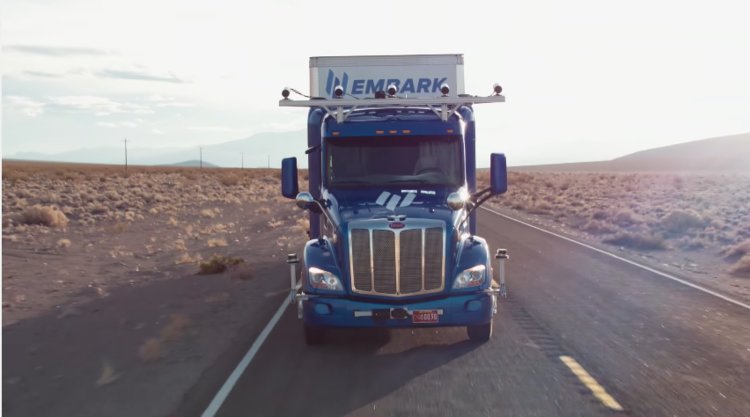This story was delivered to Business Insider Intelligence Transportation & Logistics Briefing subscribers hours before it appeared on Business Insider. To be the first to know, please click here.
Autonomous semi-trucks have long been expected to arrive before self-driving cars.

YouTube/Embark
However, a new voluntary disclosure of disengagements — the number of times a human operator had to take control of the vehicle because the autonomous systems couldn’t handle the roads — from autonomous trucking leader Embark suggests their tech may actually lag behind that of self-driving cars. Unlike self-driving passenger cars, which need to weave through traffic and around windy, narrow roads, self-driving trucks mostly need to navigate highways that are largely long, flat, and straight.
Despite such challenges, GM’s Cruise posted similar disengagement figures to Embark in 2017: GM averaged one every 1,254 miles in 2017, and the trucking startup reported an average disengagement rate of one every 1,392 miles in Q4 2018. And it’s reasonable to assume GM’s tech has only improved since 2017.
Embark’s voluntary disclosure of disengagements could suggest a few things:
- It believes its technology is ahead of other autonomous trucking startups, if not the best among all autonomous driving tech. Embark’s brazen move suggests that it is confident in its technology. The choice to disclose disengagements despite knowing that passenger car-focused firms like Cruise have posted numbers that are more impressive, all things considered, suggests that Embark is less concerned with such players.
- It’s planning to seriously pursue higher levels of autonomy, which would legally require disclosures in California. Embark hopes to eventually deploy fully autonomous trucks without steering wheels or pedals, which would require it to publicly disclose the metric in California, as Waymo, Uber, and GM all must do. As such, this early disclosure could be a way to both establish internal reporting processes around disengagements as well as endear itself to regulators and the public.
- It wishes to raise its profile in a competitive landscape. Autonomous trucking is crowded with players new and old — Waymo, Tesla, and Daimler are all trying to crack the code, among others. Embark’s move to voluntarily disclose its disengagement figures — a first for self-driving trucks — could be an effective way to build goodwill for the brand, painting it as a forthright company.
Its disengagement figures may not be astounding, but Embark recently received an important endorsement of its tech— it’s working with Amazon. Earlier this week CNBC reported that the startup was hauling freight for Amazon along a small stretch of Interstate 10 in the southern United States.
While neither firm offered any further details on their agreement, working with Amazon, even in a limited capacity, is a solid endorsement. Embark appears to be in a strong position to capture a solid share of the surging global autonomous truck market — the market for semi-and-fully autonomous trucks will grow at a 23% compound annual growth rate (CAGR) from 260,000 units last year to top 1.1 million units by 2025, according to Research and Markets.
Get the latest Tesla stock price here.
